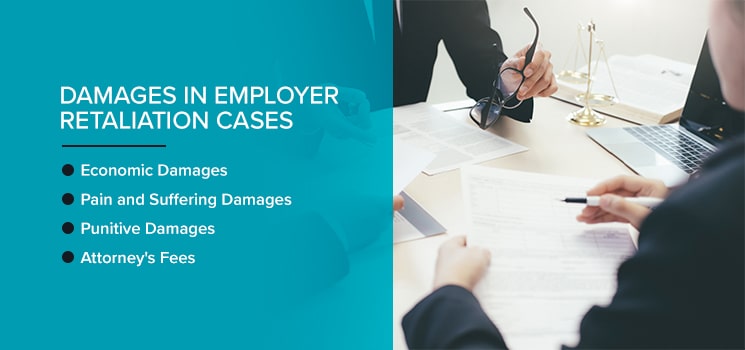Employees have legal rights that their employers must acknowledge and honor. If an employer punishes you for doing a legally protected activity, you might pursue an employer retaliation lawsuit against the company.
All cases vary, and many factors influence how much your retaliation settlement could be worth. Plus, you may recover different types of damages.
Learn more about employer retaliation cases and determine how much yours might be worth.
What Is Employer Retaliation?
Retaliation occurs when an employer punishes an employee for participating in a lawfully protected activity. Common examples of these protected activities include the following:
- Refusing to violate a state law
- Making a complaint about an unsafe work environment
- Opposing unlawful discrimination or harassment
- Making a complaint about not getting paid
- Requesting reasonable accommodations
- Taking a leave of absence under the Family and Medical Leave Act (FMLA)
- Serving on jury duty
- Filing a complaint with the labor board
- Filing a workers’ compensation or unemployment compensation claim
If the employer retaliates against an employee for taking one of these actions, they may unlawfully do one or more of the following as a form of punishment:
- Firing them
- Demoting them
- Reassigning their work
- Decreasing their wages
- Disciplining them
What Should You Do If You Suspect Employer Retaliation?
If you suspect you have been a victim of employer retaliation because you reported illegal discrimination, you can file a formal complaint with the U.S. Equal Employment Opportunity Commission. Filing a complaint is a lawfully protected activity, and workers can pursue some cases entirely through the EEOC without filing a lawsuit.
If you cannot resolve your dispute through the EEOC, you can request a right-to-sue letter, which authorizes you to file a lawsuit against your employer in court. You may be entitled to damages if you carry out your dispute with a lawyer or with an EEOC charge.
Damages in Employer Retaliation Cases
During a claim, the employee can pursue damages for monetary losses they endured as a result of retaliation. The following are the four primary types of damages a judge might award you in a successful employer retaliation lawsuit.
Economic Damages
You may be able to seize economic damages for past and future monetary losses caused by employer retaliation. Examples of economic damages include any of the following sources of income that the employee will no longer earn because their employer treated them unlawfully:
- Salary
- Commission
- Bonuses
- Hourly wages
- Benefits
You can only recover these damages if your employer fired you due to retaliation. If you quit your position or currently work for the business, you may not be able to claim these damages.
Pain and Suffering Damages
If employer retaliation caused any of these negative emotions, you may be entitled to pain and suffering damages:
- Emotional pain
- Humiliation
- Mental suffering
- Frustration and anger
- Embarrassment
- Reputational harm
These can be more challenging to recover than economic damages. To prove you suffered from emotional harm, you may have to undergo an official examination from an expert who may also testify at trial on your behalf.
Punitive Damages
In particularly egregious employer retaliation lawsuits, employees may be able to recover punitive damages. These intend to punish the company for acting with:
- Malice
- Oppression
- Fraud
Recovering punitive damages can be challenging because you need a lot of proof that the employer retaliated against you and acted in a heinous way. A jury will determine the amount of punitive damages you can recover, though under certain laws there are predetermined limits depending on the company’s size.
Attorney’s Fees
Other employer retaliation lawsuit awards may include attorney’s fees. To recover these damages, you must first go to trial and win your case. If you are successful, the court could order your employer to cover some or all attorney expenses.
Attorney’s fees sometimes exceed the worth of an employer retaliation case, which often increases the lawsuit’s settlement value. And because most cases settle, it can be advantageous for you to recover attorney’s fees.
How Much Is an Employer Retaliation Lawsuit Worth?
As every lawsuit’s circumstances vary, so do employer retaliation settlement amounts. Different factors impact your case’s worth.
- Proof: How much proof you have and the strength of your evidence will affect how much you might receive in an employer retaliation case.
- Damages: The amount or extent of the damages you endured due to retaliation will change how much money you can recover.
- History: If your employer has a history of treating employees poorly or violating their legal rights, this could increase the worth of your retaliation lawsuit.
- Egregiousness: When an employer behaves especially egregiously, this can impact your case’s value and can persuade the jury.
- Litigation: A lawsuit’s worth will vary depending on whether the case goes to court or settles in private arbitration.
- Affordability: How much the employer can afford to pay a judgment will also influence your case’s worth.
- Insurance: The employer’s insurance coverage and policies will also contribute to the value of a retaliation lawsuit.
It can be challenging to estimate the worth of an employer retaliation case without considering all the factors involved in the process.



